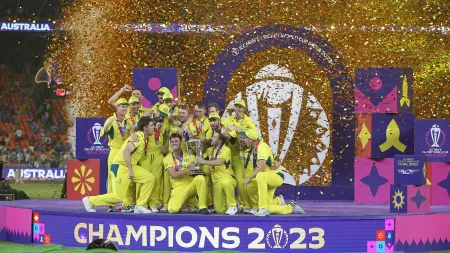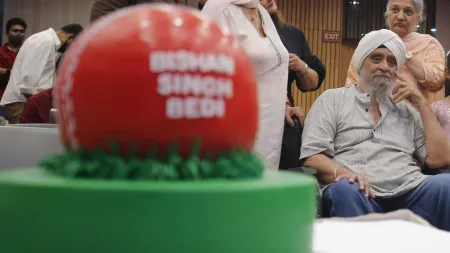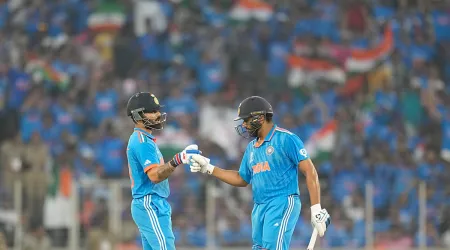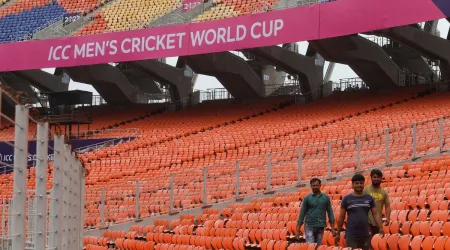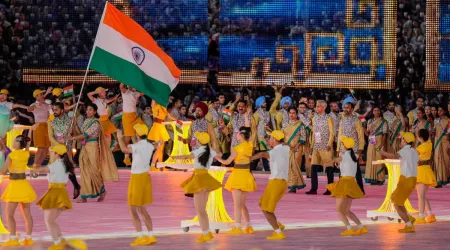- India
- International
Meet ‘Mr Pele’: The war veteran who is trying to rally Niger behind football
Djibrilla doesn’t believe in the Utopian assumption that the Nigerien youths would trade bullets for football one day, but is certain that the sport will slit open the avenues of a better livelihood.
 Colonel-Major Djibrilla Hima Hamidou got the nickname due to his father’s obsession with Pele jerseys. (Source: File)
Colonel-Major Djibrilla Hima Hamidou got the nickname due to his father’s obsession with Pele jerseys. (Source: File)
Much to his amazement, when Colonel-Major Djibrilla Hima Hamidou, the president of Niger Football Association, ushered into the spacious executive box of the FNB stadium in Johannesburg during the World Cup in South Africa, the entire room stood up and greeted in unison, “Welcome, Mr Pele,” Djibrilla felt awkward. Alright, the whole of Niger calls him “Mr Pele”, but here were FIFA dignitaries from world over, most of whom he hadn’t met or seen before. But as his compact but sturdy frame got closer to them, he noticed a sudden gasp, a few curious sighs and stray guffaws. Now it struck him, they had mistaken him for the original Pele.
Their resemblance is not unbelievably striking, but the facial contours, especially from the sides, do have an uncanny similarity. A few minutes later, the original one sauntered into the room. “Ah, here is ‘the’ Mr Pele,” someone shouted. Djibrilla just stood transfixed at the man he had idolised all his life, and whose name rings in his ears a numerous times in a day. “I just walked up to him and told, ‘Sir, people say you look like me, err… I look like you. We had a good laugh and took a photograph,” he recollects. The frame clings commandingly at his drawing room in Niamey, Niger’s capital, with an under-script, “Pele with Mr Pele”
Interestingly, though, it wasn’t the facial resemblance that prompted people to address him as Mr Pele. His father, Djibrilla, Niger’s first Sports Minister, was a “fanatical” admirer of the Brazilian legend. “It was around the 1970 World Cup, when I was eight or nine that my father began to call me Pele. I don’t remember seeing Pele playing at that time, but whenever he went abroad to France or South Africa, he used to return with a suitcase full of Pele jerseys. So everyone in the neighbourhood began to call him ‘Mr Pele’.”
The name stuck, through his days in the military school of Ivory Coast, commando training academies in France and Morocco, and later when he rapidly climbed up the ranks in Niger. The name, he says, is the biggest star of his flap. Even his enemies refer to him as Mr Pele.
A translation of a headline in a French newspaper read like this: “Commander Pele dribbles past the rebels.” It was soon after he plotted the annihilation of Tuareg rebels in the late 90s. He then, clandestinely, joined hands with rebel group Conseil de Reconciliation Nationale to topple the ruling regime helmed by Ibrahim Bare Mainassara. Later, he masterminded the most recent coup, in 2009-10, when squadron chief Djibo Salou seized power from then president Mamadou Tandja.

Unlike most many-war veterans, though, he doesn’t like bragging about his exploits and ambushes. He asserts he doesn’t like talking of war and coups. “It’s an experience. You experience it and you try to forget it. You don’t want to be reminded of it,” he says, his face contorting and eyes turning red, almost blood shot. Football administration, thus, is an escape from the unpleasant realities he has encountered in his life. “In the last few years, I decided not to devote too much time to military and instead focus on developing football in the country,” he says.
He doesn’t believe in the Utopian assumption that the Nigerien youths would trade bullets for football one day, but is certain that the sport will slit open the avenues of a better livelihood. “We are talking about developing the game in one of the poorest countries in the world. Not just poverty, our country has to deal with a lot of issue, terrorism, unemployment, illiteracy, migration, the list is endless,” he says.
To put their backwardness into perspective, it’s plunged last in the UN’s literacy index (187), 92 per cent women are illiterate, are fifth in infant mortality rate and 16th in migration causality. The legal age for marrying is 18, but the mean is 15. There is Boko Haram, Islamic State and offshoots of Al-Qaeda. The population is exploding. Birth control measures are nonexistent. To round it off, 80 per cent of the country is covered by Sahara. “I like to tell people that my country is peaceful, but I’d be lying if I say so. It’s not safe, not for us, not for tourists. We’re trying out best to snuff out these elements, but it will take time,” he says.
Change in perception
Even football, a couple of decades ago, was taboo, a symbol of western influence. Followers of it are called palais, a word for young people who ape the Western culture.
His first big challenge was to change people’s perception. “For a whole decade, we have experienced internal quarrels of the leaders who prevented the ball from rolling on the pitch. Football was more in the media, on television than on the pitch,” he said.
He himself pumped in a lot of money, overhauled the domestic structure, roped in the help of experts from Morocco, Algeria and Nigeria to revitalise the game. “Until that time, it was difficult for kids to get even basic amenities like a football, forget about decent grounds, gym, boots, shin guards and stuff like that,’ says assistant coach Hamidou Harouna. Also, they spread the game to the villages, an attempt to decentralise the game fro, Niamey, where most of the football still happens. The president and Co immediately made the first division league a six-month affair with 14 teams playing each other home and away.
“Previously, they used to play just eight matches a year at one ground. The subsidy for each club too was increased from 500,000 CFA francs (which is a paltry Rs 60,000). It’s a small amount everywhere, but for the clubs back there it means a lot,” Djibrilla says. But he realised that he and his team should be patient to yield results.
“It’s not like an ambush, where you make a plan and just blow the bunkers,” he says, a rare instance of him resorting to a military analogy. Then arrived the breakthrough moment, they qualified for the African Cup of Nations in 2012. They lost all three group game, but when the players returned home, each of them was awarded 300,000 CFA francs. As importantly, several of the players were picked by European clubs, not the big one, but tier-two ones. But it was still a huge step forward for a reeling country. And now there qualification for the under-17 World Cup, where they reached beating Nigeria, the most successful team in under-17s.
Remarkably, they showed no stage fright and beat North Korea, a country with more footballing pedigree. “This troop of players is good. They will take us to the big World Cup,” he says. Niger qualifying for a senior World Cup is his burning dream. Another is to bring Pele to Niger. And perhaps show him the picture in his drawing room, of Pele and Mr Pele. And bore him to death with warfront tales.


















